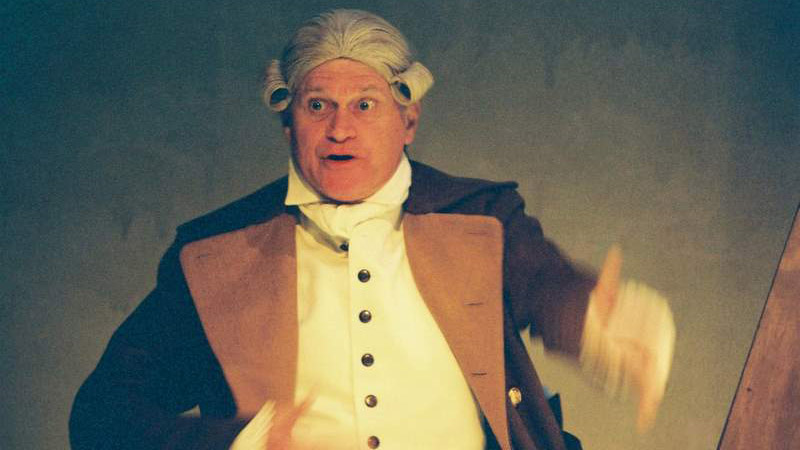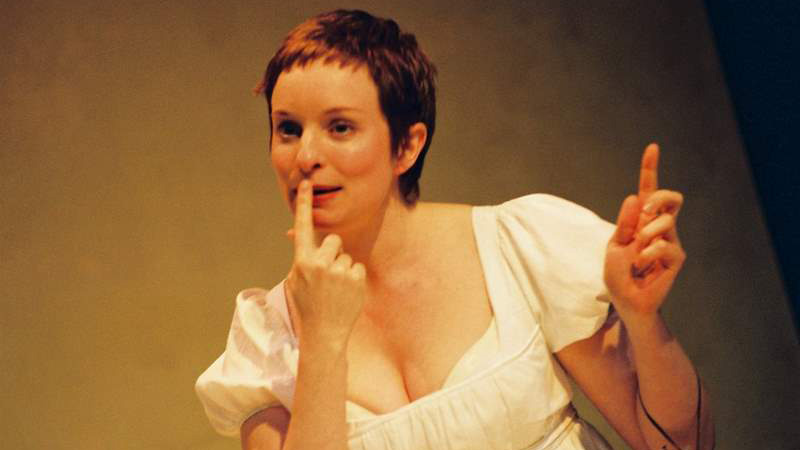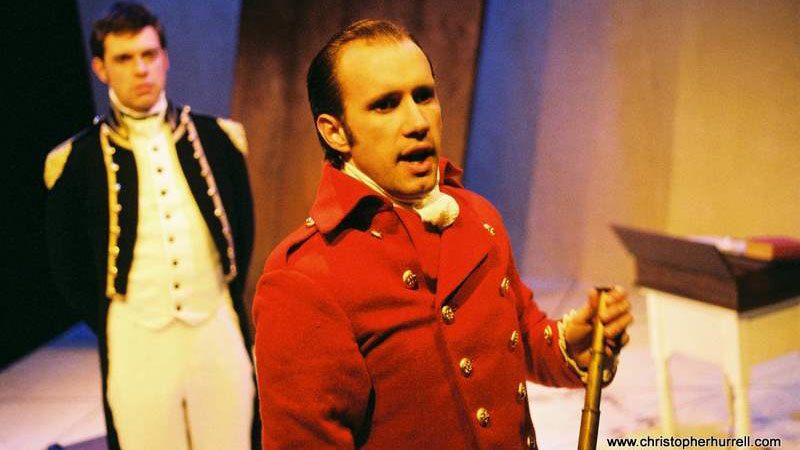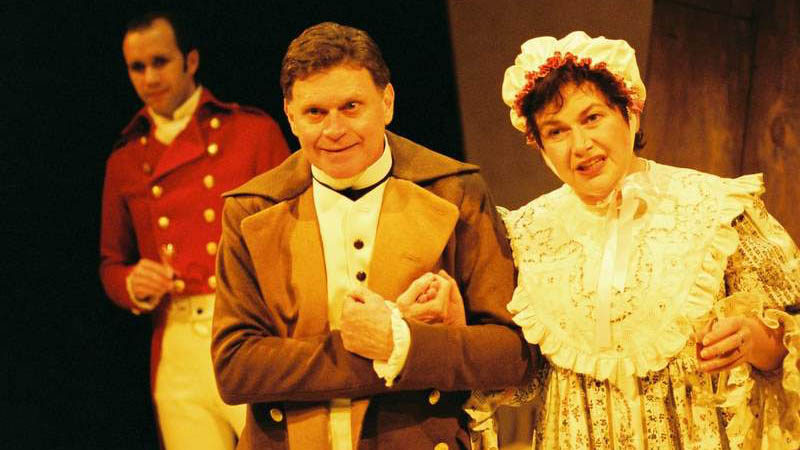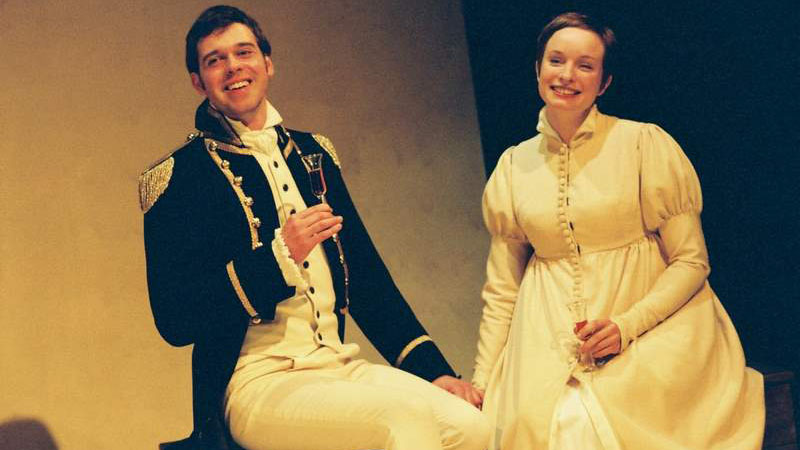Navigating Flinders
Ensemble Theatre
Sydney 2005
Based upon the life of Captain Matthew Flinders
Winner – Taffy Davies Memorial Award for Best New Australian Work - 2005 GLUG Awards
This production engagingly tells us part of the story of where many of us came from, and how a man like Flinders sped along the dispossession of this continent and the establishment of British rule.
Christopher Hurrell is a major emerging director.
GREEN LEFT WEEKLY
Cast
Jonathan Gavin
as Matthew Flinders
with
Eamon Flack
Ksenja Logos
Drew Forsythe
Fiona Press
Director
Christopher Hurrell
Designer
John Senzcuk
Lighting Designer
Stephen Hawker
Sound Designer
Basil Hogios
Assistant Director
Velalien
Stage Manager
Glenn Dulihanty
Wardrobe Supervisor
Tirion Rodwell
Paper Properties
Colleen Reeks
Dialect Coach
Jennifer White
Flautist
Michael Sitsky
REVIEW BY BRENDAN DOYLE
There must have been a conspiracy to make Australian history boring when I was at school. Matthew Flinders was in a little boat with Bass and a cat, wasn’t he? We were discouraged from looking critically at our past, instead having it presented in the most simplistic and jingoistic terms. Preparing for the Queen’s visit in 1954 by dancing around the maypole, we were meant to identify with the colonising power. What we kids called Cracker Night was still officially Empire Day.
Times have changed, of course, and now kids are encouraged to be true-blue Aussies and identify with blond sporting heroes who can beat the pants off the Brits. Meanwhile, the prime minister tells us we have to move on from the past. Heaven forbid that we should feel bad about such unfortunate past events as the war in Vietnam or the bombing of Baghdad.
However, many playwrights have urged us not to gloss over the past, but to learn its lessons. From Shakespeare to Bertolt Brecht and through to David Hare’s Stuff Happens, which dramatises the history of the invasion of Iraq, playwrights have been inspired by historical characters and events. In Australia, such plays have included The One Day of the Year, about the Anzac myth, The Legend of King O’Malley, Alexander Buzo’s Macquarie, Don’s Party, The Odd Angry Shot about the Vietnam War, and Stephen Sewell’s many political plays.
So it is good to see this world premiere production of Navigating Flinders, a memorable play by Don Reid, a founding member of Sydney’s Ensemble Theatre, home of so many new Australian plays.
John Senczuk’s bold set design, with Flinders’ incomplete map of Australia filling the stage floor, invites us to enter a dramatic world that is both an epic history and the ultimately tragic story of an individual caught up in the imperial ambitions of Britain and France.
The action is set mainly on the island of Mauritius, where Flinders, having achieved his ambition of circumnavigating and mapping the continent, is being detained by French General de Caen who has charged him with spying. The play then moves back and forth between various moments of Flinders’ life, from his marriage in Lincolnshire to his six years in Mauritius without his wife, where he falls under the spell of Mademoiselle Delphine, to his ultimate return to England and a sad demise.
As with Shakespeare’s history plays, Reid has concentrated on the character of Flinders the man, with all his passions and foibles. He is a man of action, but also a product of the historical and class context he was born into. When it is announced that an Aborigine has been shot by one of his men, he is angry at first, but declines to punish the man involved. His maps matter more to him than justice for the native population.
The acting is uniformly excellent, but Drew Forsythe is outstanding as he moves effortlessly between playing Joseph Banks, General de Caen, Nicolas Baudin and others, sometimes within seconds. Jonathan Gavin as Flinders is convincingly British but also vulnerable in matters of the heart. Ksenja Logos is equally at ease as the dour Ann or the vivacious Delphine.
Christopher Hurrell is a major emerging director. I admired his production of Sewell’s recent Myth, Propaganda and Disaster, and again he has served the play well. Hurrell also helped Reid rework the script and successfully give it a more contemporary feel.
Reid says he didn’t set out to write a history lesson. “It’s about making choices and having to live with the consequences.” Flinders chooses to leave behind his wife of three months to pursue adventure, career and ambition. He goes back to her six years later a sick and forgotten man. The English ruling class is now more preoccupied with fighting Napoleon than looking at maps.
This production engagingly tells us part of the story of where many of us came from, and how a man like Flinders sped along the dispossession of this continent and the establishment of British rule.
From Green Left Weekly, August 10, 2005.
